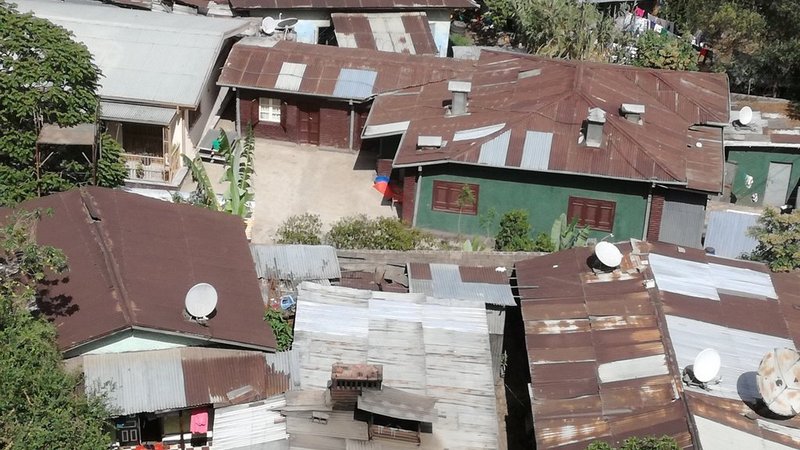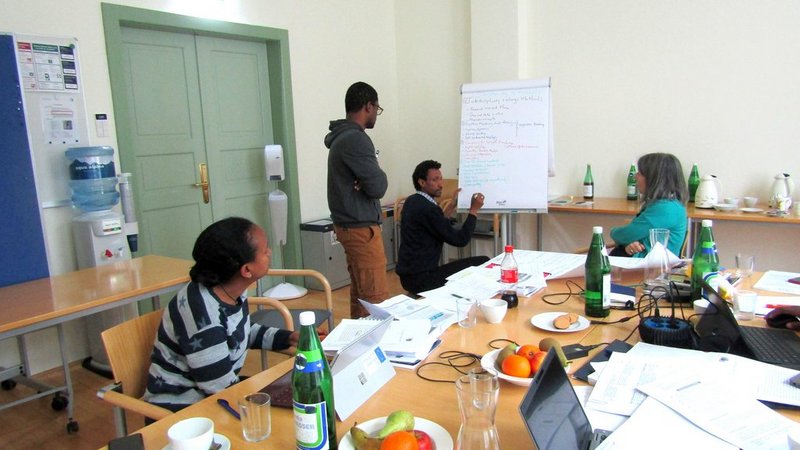Strengthening Research and Educational Competences of HEIs for Gender sensitive Urban (InfoRmal Settlement) Transformation | GIRT

Project Coordinator: Tania Berger
Coordinating Institution: University of Continuing Education Krems (UWK)
Partner Institutions: Addis Ababa University (Kumela Gudeta); Bahir Dar University (Atsede Desta); University of Mekelle (Daniel Semunugus); Lurió University (Antonio Manuel de Amurane)
Partner Countries: Ethiopia, Mozambique
Project Duration: 1 May 2022 – 30 April 2026 (48 months)
Project Overview
The project entitled “Strengthening Research and Educational Competences of HEIs for Gender sensitive, InfoRmal settlements’ Transformation” (GIRT) specifically looks at women’s daily lived experiences in informal settlement and the impact that the Covid19 pandemic is having on them in Ethiopia and Mozambique.
In the rapidly growing cities of these two countries (annual population increases above 4%), informal settlements cater for the housing needs of a substantial proportion of the urban population, especially the low-income sections of society. While overcrowding, lack of basic infrastructure and unhygienic living conditions render inhabiting informal settlements generally difficult for most residents, this is especially true for women who often carry the majority of household related duties under these challenging living conditions. They are especially affected by deficiencies in basic sanitation, because public taps, toilets and bathing facilities frequently represent unsafe locations for them as well as their children. Difficulties have been further exacerbated by the impacts of Covid 19, as proper hygiene is extremely difficult to maintain in most informal settlements. These densely populated areas also do not allow for social distancing to prevent the spread of the virus. They were therefore hot spots of outbreaks. At the same time, measures implemented to contain the spread of the virus are taking a severe economic toll mostly on low-income daily wage earners working in the informal economy, who often reside in informal settlements. However, there is still few data on Covid 19’s exact impact on female residents in informal settlement of Ethiopia and Mozambique. Given the overall scarcity in research on informal settlements in both countries – and the prevailing contestations over these settlements in the public realm – it is little surprising that few attempts have been made to specifically investigate the “female face of urban informality” through the lens of women’s daily lived experiences, navigating constraints and challenges in informal housing.
The GIRT project partners from Ethiopia, Mozambique and Austria have previously worked together on informality in housing and conducted essential research that enables them to now explore viable solutions for pressing daily challenges in selected informal settlements with a focus on women’s needs. GIRT will perform qualitative, in-depth research following selected scientific approaches such as housing pathways and feminist standpoint theory to identify not just problems but also coping strategies and potentials for change. At the same time, the project also seeks to employ a set of tested transdisciplinary (Td) methods to engage with local, often multi ethnical stakeholders in 4 cities (Addis Ababa, Bahir Dar and Mekelle in Ethiopia and Nampula in Mozambique) in a strive to identify scalable approaches for improvements of women’s living conditions in selected settlements. GIRT will build capacity in essential Td methodologies in the partner universities which will be empowered to function as catalysts of change. In close partnership with local stakeholders, GIRT project partners will co-produce and share new, locally specific knowledge on real world problems and learn how to apply it to improve female informal residents’ living conditions on the ground.
GIRT Report on the 1st project year (1 May 2022 - 30 April 2023)

The project kicked off with a virtual meeting of (nearly) all project team members held on June 13, 2022: all team members participated online and were introduced to the project goals and overall design. First exchange over challenges and specific local situation regarding informal housing took place between the teams of partner institutions.
The teams then set out to select informal settlements in all their respective partner regions. For this purpose, they jointly developed a list of criteria to identify settlements with previous engagement of their institutions as to enable potential long-term science-society cooperation. The settlements selected comprise of both older, inner-city locations as well as peripheral, peri-urban districts on city fringes. They thus represent a wide variety of different housing situations with broad similarities as well as stark differences.
Key Outputs
- Training manuals for Td processes in each partner HEIs in local languages, including manuals for conducting research with women in informal settlements. GIRT Manual in Amharic
- Short courses / staff trainings delivered in each partner region for conducting Td processes, including 4 short courses / staff trainings for conducting research with women in informal settlements.
- Staff exchanges for conducting Td processes conducted among staff and students of all partner HEIs, as well as exchanges for conducting research on women in informal settlements.
- PhD colleges for selected topics in informal settlements and urban transitions; call for students announced & suitable candidates selected for participation of activities.
- List of selected informal settlements available.
- List of engaged stakeholders, written confirmation of their engagement in local Td process in each partner HEI.
- Reports on local Td processes in each selected informal settlement and report on findings, experiences and solutions developed in Td processes & generalized policy recommendations.
- Research on female perspectives: Reports on local research with affected female residents conducted in selected informal settlements in 4 partner regions and report on findings from research in all 4 selected informal settlements condensed inter-regionally and cross-nationally.